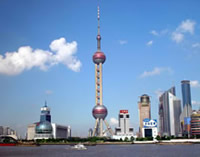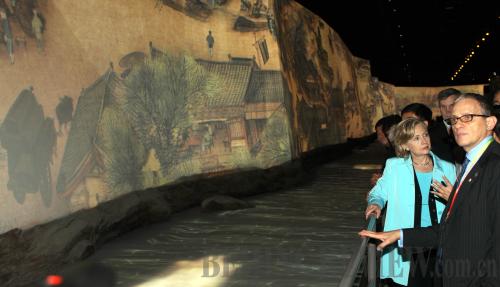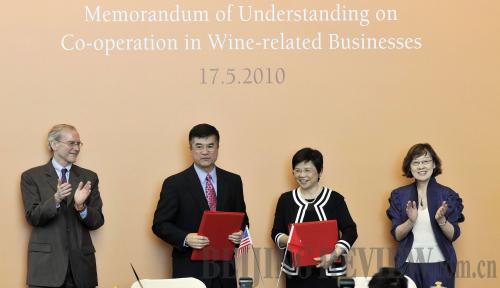|
|


ADVERTISEMENT
Buy Your own advertising
spaces!
.
Download Adobe Acrobat Reader to open [PDF] files.
Recent Visitors
A Mechanism Aiming To Build Trust
2010. 7 June
The Strategic and Economic Dialogue facilitates better understanding between the United States and China The talks yielded no surprises: In areas that the United States and China have overlapping interests, they agreed to enhance cooperation and where their interests diverge they tried to better understand each other's positions and pledged to keep talking.
by Bonnie Glaser
(bjreview.com.cn)
p>After a year of ups and downs in the Sino-American relationship, the second round of the Strategic and Economic Dialogue (S&ED) was held in Beijing from May 24-25. The two days of in-depth discussions provided an opportunity for senior officials from both countries with responsibility for diplomatic and economic issues to exchange views on an ever-expanding agenda of bilateral, regional and global problems.
 A DYNASTIC DISPLAY: U.S. Secretary of State Hillary Clinton visits the China Pavilion at the World Expo in Shanghai on May 22. The stop took place during her trip to China for the second round of the China-U.S. Strategic and Economic Dialogue (ZHANG MING)
A DYNASTIC DISPLAY: U.S. Secretary of State Hillary Clinton visits the China Pavilion at the World Expo in Shanghai on May 22. The stop took place during her trip to China for the second round of the China-U.S. Strategic and Economic Dialogue (ZHANG MING)
A conspicuous change in tone from the first round of the S&ED underscored that, over the past year, high expectations held by both countries for rapid progress toward a closer Sino-U.S. partnership have given way to more realistic stances. At the inaugural session last summer, Secretary of State Hillary Clinton repeatedly said the United States and China were "in the same boat" and should row in the same direction in order to overcome the economic crisis and address a host of global challenges. This year, however, Clinton emphasized that the two countries have different histories and are at different stages of development.
Vice Premier Wang Qishan similarly stressed that the United States and China have differences "in history, culture, national conditions, development stage, economic structure, and market sophistication," but now are able to manage these differences in a "more rational and mature manner." Clinton's counterpart, State Councilor Dai Bingguo, said the two countries would inevitably have disagreements and differences and called for both sides to "respect each other's core interests and major concerns."
Nevertheless, both sides continued to espouse the view that U.S.-Chinese cooperation is essential. Clinton re-stated the assessment put forward by President Barack Obama at the first round of talks that "few global problems can be solved by the United States or China acting alone. And few can be solved without the United States and China working together." Dai Bingguo echoed this view, noting that the chances for peace in the 21st century will be seriously undermined if the United States and China are unable to establish a new type of partnership.
The discussions in Beijing between about 50 representatives from more than 40 departments of both countries yielded 26 results, including agreements to strengthen exchanges and cooperation in areas such as energy, the environment, science and technology, culture, education, health, customs, nuclear security, and law enforcement. The two sides signed seven documents on cooperation in nuclear safety for the AP1000 nuclear reactor, shale gas development, eco-partnerships, supply chain security, and infectious diseases, and reiterated their commitments to actively implement the U.S.-China Memorandum of Understanding to Enhance Cooperation on Climate Change, Energy and Environment and the 10-Year Framework on Energy and Environment Cooperation.
On issues where differences prevailed, there was a candid exchange of views and both sides agreed to continue close consultations. For example, the plenary session that was chaired by Secretary of State Clinton, State Councilor Dai Bingguo, Secretary of the Treasury Timothy Geithner, and Vice Premier Wang Qishan focused on development issues, but the wide gap between the two countries' approaches to development assistance was not narrowed.
On human rights, there was agreement to continue to hold discussions on the basis of equality and mutual respect, and specifically to follow on the bilateral human rights dialogue held in Washington, D.C. from May 13-14 with another round of talks next year in China.
Regarding actions that should be taken following the sinking of the South Korean naval vessel Cheonan, there was no convergence of views. The United States urged Beijing to join with other members of the international community in fashioning a tough response to North Korea's provocative action, but China remained unconvinced that North Korea was the culprit. At the same time, shared interests in Korean Peninsula stability and denuclearization were reaffirmed.
Admiral Robert Willard, Commander of the U.S. forces in the Pacific, made a plea for establishing closer and more sustainable ties between the U.S. and Chinese militaries, and proposed that U.S. Defense Secretary Robert Gates visit China in June. The Chinese side insisted that U.S. arms sales to Taiwan, along with frequent reconnaissance by U.S. naval ships and aircraft in the waters and airspace of China's exclusive economic zone, remain obstacles to stable U.S.-Chinese military relations.
 A GLOBAL TOAST: Visiting U.S. Secretary of Commerce Gary Locke attends the signing ceremony of a document on U.S.-Hong Kong cooperation in wine-related industries with Rita Lau Ng Wai-lan, Secretary for Commerce and Economic Development of the Hong Kong Special Administrative Region in Hong Kong on May 17 (LIU XIAOWEI)
A GLOBAL TOAST: Visiting U.S. Secretary of Commerce Gary Locke attends the signing ceremony of a document on U.S.-Hong Kong cooperation in wine-related industries with Rita Lau Ng Wai-lan, Secretary for Commerce and Economic Development of the Hong Kong Special Administrative Region in Hong Kong on May 17 (LIU XIAOWEI)The U.S. side lobbied against Chinese government procurement rules that give preference to products with intellectual property developed in China and voiced its concerns about China's indigenous innovation policies. Beijing criticized U.S. controls on exports of hi-tech equipment to China and asked the United States to grant China market economy status.
After 100 hours of dialogue, one important consensus reached was that the S&ED is a valuable mechanism to promote the shared vision of presidents Hu Jintao and Obama for a positive, cooperative, and comprehensive bilateral relationship in the 21st century. Both sides recognize that there is a deficit of strategic trust that inhibits greater cooperation and they hold out hope that the S&ED will facilitate better understanding and enable a broadening of common interests that can underpin a genuine Sino-U.S. partnership in the future.
The author is a senior fellow at the Center for Strategic and International Studies in Washington, D.C.
(The viewpoints in this article do not necessarily represent those of Beijing Review)
Source: bjreview.com.cn

